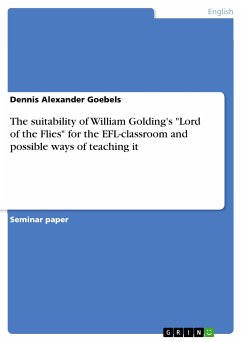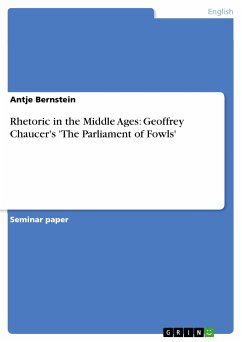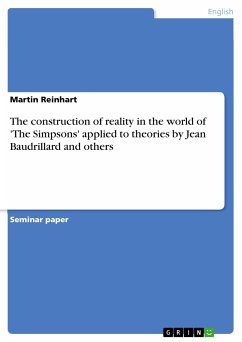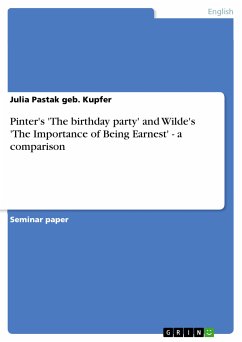Seminar paper from the year 2003 in the subject English Language and Literature Studies - Literature, grade: 2,0 (B), http://www.uni-jena.de/ (Institute for Anglistics/American Studies), language: English, abstract: William Gerald Golding was born at St Columb, Cornwall, on 19 September 1911. He died on 19 June 1993 in Truro, Cornwall. Golding became a Fellow of the Royal Society of Literature in 1955 and was awarded the CBE in 1966. In 1980 he received the Booker Prize and in 1983 Golding was awarded the Nobel Prize for Literature. His multiple interests were to a considerable degree present in his writing. His fascination for archaeology is reflected i n The Inheritors 1 (1955) that Golding referred to as his own favorite among his novels. While digging as an amateur archaeologist, he discovered the remains of an old woman. He expressed his sensations when the skeleton was covered again with earth: “There is a sense in which I share the guilt buried beneath the runway, a sense in which my imagination has locked me to them. I share in what was at the least a callous act - in what at the worst may very well have been prehistoric murder.” Evolution and religion, two of the themes, which reappear throughout Golding’s writing, are addressed in The Inheritors. The most fundamental contribution to the evolutionary insight that man developed from animal, ape- like ancestors in the dim and distant past made Charles Darwin. His theory placed man at the top of evolution. Evolution became a synonym for progress. This new era of thinking influenced writers and provoked a strong reaction. One important example is The Outline of History by H.G. Wells, a rational supporter of the Darwinian theory. Deliberately prefixed to The Inheritors is the epigraph from The Outline of History. So the reader enters the novel with this passage in mind. … We know very little of the appearance of the Neanderthal man, but this … seems an extreme hairiness, an ugliness, or a repulsive strangeness in his appearance over and above his low forehead, his beetle brows, his ape neck, and his inferior stature. … Says Sir Harry Johnston, in a survey of the rise of modern man in his Views and Reviews: ‘The dim racial remembrance of such gorilla-like monsters, with cunning brains, shambling gait, hairy bodies, strong teeth, and possibly cannibalistic tendencies, may be the germ of the ogre in folklore. …’ (7) It served as the initial stimulus for Golding’s work about the clash of two different species - the Neanderthal man and the Cro-Magnon man. The book turned up with high frequency on the lists of The World’s Ten Most Important Books or The Ten Most Important Books in My Life. [...]
Bitte wählen Sie Ihr Anliegen aus.
Rechnungen
Retourenschein anfordern
Bestellstatus
Storno









